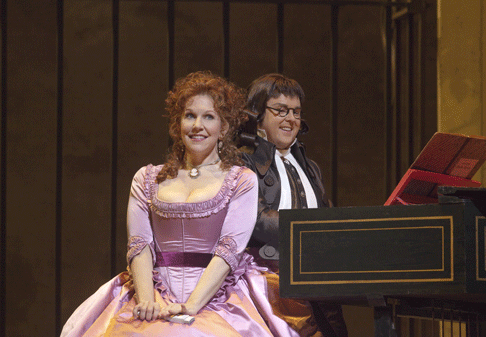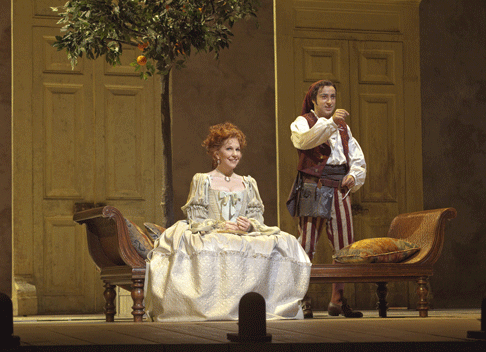The complicated
story was told clearly, the stage pictures were handsome and the set changes
elegant, the funny business funny and to the point, the movement rapid. Even
Rossini’s thunderstorm got laughs, as a projected starry sky was
gradually effaced by clouds and real rain while the set spun around below. I
wasn’t crazy about the barber’s updated costume and I could have
done without the donkey — the donkey is the one item Mr. Sher retained.
Figaro’s costume is back to tradition.
The Sher production does not get in the way of the storytelling (a major
point! especially in a comic opera), does not introduce new sub-plots the
composer never delineated (a defect of the recent stagings of Tosca,
Sonnambula and Fidelio, among others), the stage pictures are
attractive and will endure repeated viewing (unlike Tosca), the funny
business is sometimes funny — and gives scope, as a comedy staging
should, for funny performers to make it more so; there are inexplicable touches
(what is that giant anvil in the sky, aside from a sign of Mr. Sher out of
ideas? Why does Bartolo’s china closet explode?), and the movement is
constant if not always logical. Seville, indicated in the previous production
by the city’s famous white walls and a splendid conservatory in the
courtyard of Bartolo’s mansion, is now implied by many, many doors and an
orangery. At one point, the Count, playing a drunken soldier, makes a swipe at
an orange tree with his saber — and appeared to slice it through —
the best laugh of the night. I’d give the production a solid B, maybe a
B-plus.
The most distinctive part of the Sher staging — aside from the
moveable doors that comprise most of the set, and which are often used to
delightful farcical advantage — is the platform around the orchestra pit
that allows singers to leave the action and come warble to us intimately, duck
out of busy action entirely, complain about how badly they are being used by
other characters — or hand out business cards to the audience, as Figaro
does during the curtain calls. This parade in front of the apron also allows a
solid but underpowered cast to make a more powerful effect than they would if
they remained center stage. There was certainly an improvement in sound quality
when they stepped forward.
Among the singers last Thursday night, the smoothest, most elegant, most
satisfying performance came from Bulgarian newcomer Orlin Anastassov, who
possesses the requisite size, depth and legato for Don Basilio and is an
amusing comic actor to boot. It is no surprise to see in the program that he is
singing Boito’s Mefistofele elsewhere this year —
that’s an opera that the Met could certainly use back in its repertory,
and he’s a likely candidate to put over a role that calls for an agile
actor as well as a remarkable voice.
 Joyce DiDonato as Rosina and Barry Banks as Count Almaviva
Joyce DiDonato as Rosina and Barry Banks as Count Almaviva
Rodion Pogossov, a showman of great charm and comic energy — you may
well remember his Papageno — sang a most entertaining Figaro, with a
seductive and self-seductive way of phrasing. John Del Carlo, a familiar and
excellent buffo quantity, fudged the racing patter of “A un dottore del
mio sorte,” as so many Doctor Bartolos do, but proved an effective foil
for the antics of all the others throughout the evening. You can’t have a
farce if the villain isn’t convincingly alarming — if he’s
not, nobody else’s antics make sense. Del Carlo, tall as a Wagnerian
giant, can be alarming while full of self-pity, which is just what we want.
Barry Banks is a comic actor the equal of any bel canto tenor going —
his smarmy smiles as the feigned “Don Alfonso” were especial joys
— and his coloratura technique is remarkable, but the quality of the
voice itself was dry in “Ecco ridente” and rather hollow the rest
of the night. Dramatic intensity (as Oreste in Rossini’s
Ermione) and delirious self-parody (as Thisbe in Britten’s
Midsummer Night’s Dream) are his fortes; romantic heroes are
not.
 Joyce DiDonato as Rosina and Rodion Pogossov as Figaro
Joyce DiDonato as Rosina and Rodion Pogossov as Figaro
Joyce Di Donato is a few years into an important career. She is an excellent
comic actress — you listen to her, yes, but you also watch, just to see
what madcap business she’ll come up with next. She works the manic
fireworks of “Contro un cor” in the Lesson Scene into a
simultaneous show of brilliant vocalism and stage hilarity like no other Rosina
I’ve seen. When she dashes out on that walkway to deliver the
evening’s few big phrases, her strong line suggests that many of the
grander bel canto roles (Adalgisa, Elisabetta Tudor, La Favorite)
would suit her nicely, but in some of her rapid-fire phrases in “Una voce
poco fa” and elsewhere, she seemed too anxious to race up and down the
scale to bother with the note-perfect ideal flow of a Horne, a Berganza or a
Swenson. She seems to love to play this role and to be on stage with these
other singers, but a little more technical focus (and you just know
she could do it) would make hers an extraordinary Rosina instead of merely a
very good one. Claudia Waite, the Berta, sang her “sherbet aria”
with the shrill, ungrateful tone one expects of, well, Berta the laundress.
Maurizio Benini in the all but invisible orchestra pit kept the wheels
turning precisely without calling attention to himself — it was not a
Mozartean reading of the score but a reliable base for the farcical doings on
stage. The whole evening seemed calculated in that direction, and it was
gracious of him to be so self-effacing, but sometimes Rossini works well as a
partnership.
John Yohalem
![Above: Joyce DiDonato as Rosina [Photo by Ken Howard courtesy of Metropolitan Opera]](http://www.operatoday.com/BARBIERE_DiDonato.gif)

